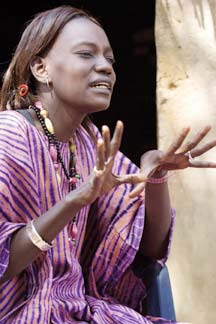Glad Tidings…to all people
Posted: 12/01/06
| Baptist missionary Shirley Smith (right) visits the family of a Futa Toro man in West Africa who has recently returned from a pilgrimage to Mecca, the center of Islamic life. (IMB photo) |
Glad tidings… to all people
By Ken Camp
Managing Editor
Luke’s Gospel account of Christ’s birth describes how angels announced to shepherds good tidings of great joy for all people. But 2,000 years later, more than one-fourth—perhaps many more—of the world’s people still haven’t heard the good news or seen evidence of it.
Estimates vary widely regarding the number of least-evangelized people and unreached people groups.
| See Related Articles: • Glad Tidings…to all people • Glad Tidings: What's your mission? • Glad Tidings: BGCT offers multiple missions opportunities |
The Joshua Project, a ministry of the U.S. Center for World Mission, identifies 6,514 unreached people groups numbering 2.6 billion—40 percent of the world population.
The Southern Baptist Convention’s International Mission Board identifies 2,040 unreached people groups of 100,000 or more. The board’s global research department also lists 3,349 people groups, with a total population of more than 614 million, who are unreached and not engaged by anyone.
Various groups define “unreached” in different ways, but many missions agencies and networks agree at least 28 percent of the world’s people lack access to the gospel.
 |
| A Wolof Christian tells a Bible story in a village northeast of Dakar, Senegal. She was disowned by her family after becoming a believer, and her children were taken away because of her faith in Jesus. (IMB photo) |
Surprisingly, many missions groups across denominational lines also have strikingly similar goals—to share the gospel through both word and deed in culturally relevant ways and that result in church-planting movements.
“It’s a holistic approach. Sometimes we speak in terms of transformational church planting movements, where congregations plant congregations that then plant congregations, all of which transform their communities,” said Kent Parks with Cooperative Baptist Fellowship Global Missions.
Not all unreached people groups live in remote, inaccessible locations, said Parks, a Hardin-Simmons University graduate who has spent much of his life in Southeast Asia.
Some live in major urban centers, but they lack access to the gospel because of cultural, political, socio-economic or language barriers, he noted.
Effectively presenting the gospel message to unreached people involves approaching them at their level of understanding and in a culturally appropriate way. For example, rather than presenting a systematic list of spiritual laws or steps toward God, many missionaries have found the best way to present biblical truth is through chronological storytelling.
“It has nothing to do with intelligence. It’s just that their minds are geared differently, and they are oral-preference learners,” Parks explained.
The chronicling approach allows people from storytelling cultures to grasp the essence of biblical teaching in ways that create disciples with transformed lives, he added.
“It’s obedience-based—not knowing everything Jesus commanded but doing everything Jesus commanded,” he said.
 |
| The Fulani of Nigeria, West Africa, are primarily nomadic cattlemen who consider themselves to be the “keepers of the torch of Islam.” (IMB photo) |
Jesus Christ set the example for effectively communicating the good news to unreached people, Parks said, quoting Eugene Peterson’s The Message paraphrase of John 1:14—“The Word became flesh and blood, and moved into the neighborhood.”
“It involves moving into the neighborhood and in culturally relevant ways living out and speaking out the gospel,” he said.
Emphasis on cultural relevancy and communicating the gospel through both words and actions are woven throughout the Ethne initiative—an international movement focused on making disciples among the world’s least-reached people.
Parks serves as co-facilitator for the ongoing Ethne initiative. He and his wife, Erika, along with Stan Parks of WorldconneX, the missions network launched by the Baptist General Convention of Texas, were among the planners for the Ethne ’06 conference in Southeast Asia earlier this year, but three-fourths of the leaders of the global network—and about 90 percent of the participants—are non-Western.
“One of the strengths of Ethne is that it is built on what has gone before,” he said.
Specifically, it grew out of the AD 2000 & Beyond Movement, the Great Commission Roundtable and Singapore ’02. But it also is closely linked to the Lausanne Committee for World Evangelization and the World Evangelical Alliance Missions Commission.
“We’re not just doing our own thing,” Parks said.
Several strategy groups developed from the spring Ethne conference, including a frontier crisis response network that links groups in disaster relief with the goal of enabling long-term teams to live among unreached people.
A strategy group focused on prayer initiatives offers Texas Baptists an opportunity for personal involvement, Parks noted. Ethne is developing prayer resources about unreached people groups that will be available online at www.ethne.net. Online pray-er requests are available in at least four languages. A prayer resource DVD produced by Ethne has six audio language tracks and subtitles in 17 languages.
 |
| A Bambara mother beams with pride as she lifts her child into her arms. About 4 million Bambara live in Mali, West Africa. More than 85 percent follow Islam. (IMB photo) |
WorldconneX has online links to a variety of resources that can help churches connect with groups focused on unreached people groups. Visit www.worldconnex.org.
The International Mission Board also has developed PeopleLink, an initiative to connect churches to un-reached people groups in a variety of ways, including intercessory prayer. For details, visit www.imb.org/WE/pplink.asp.
A key way churches can become involved in meaningful, strategic ministry among unreached people groups involves prayer and vision trips. These trips allow participants the opportunity to “pray on-site with understanding” and build lasting relationships.
Some people groups respond negatively to short-term “drive-by” missions volunteers who enter an unfamiliar culture, work on a project and then move on, Parks said.
On the other hand, he pointed to the example of a man who said he might be willing to listen to what a volunteer told him because the Christian took time to “sit and drink tea with us.”
Relationship-building involves not only investing time with unreached people, but also working with Christians from other cultures who already are bridging gaps and developing strategies to bring about long-term transformation among the least-evangelized people.
“Find ways to do something strategic—to be part of a bigger plan,” Parks urged.
“It’s a growing movement, and I don’t want Texas Baptists to be left behind.”
Looking at the international scope of Ethne and what he sees as the movement of God among non-Western Christians, Parks expressed optimism about 21st century missions.
“God is putting humanity back together and breaking the Babel curse,” he said. “God is continuing a process that started at Pentecost, weaving us back together.”
News of religion, faith, missions, Bible study and Christian ministry among Texas Baptist churches, in the BGCT, the Southern Baptist Convention ( SBC ) and around the world.